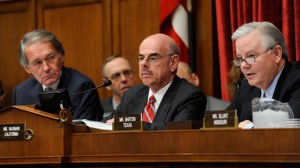Colorado wildfires have caused about $450 million in damages over a few short weeks. Towns and cities from coast to coast have experienced massive heat waves. Meanwhile, record high temperatures have caused the kinds of droughts that make crop pollination damned near impossible. One crop biologist recently told Bloomberg News that current conditions are “like farming in Hell.”
And it’s not even August yet.
This weather can be blamed on a shift in the climate triggered by human actions from years ago. And with Congress virtually ignoring the problem today, you can only imagine how much more you’ll be sweating tomorrow.

House Energy and Commerce Committee ranking Republican Rep. Joe Barton, R-Texas, right, speaks on Capitol Hill in Washington, Monday, May 18, 2009, during the markup of legislation on global warming and climate and energy strategy. Committee Chairman Rep. Henry Waxman, D-Calif. is at center, and Rep. Edward Markey, D-Mass., listen as left. (AP Photo/Susan Walsh)
The country’s best opportunity to mitigate climate change came three years ago, soon after President Barack Obama took office, with a friendly Democratic Senate and House of Representatives. The American Clean Energy and Security Act (otherwise known as Waxman-Markey, after its sponsors) passed the House – barely.
It later failed in the Senate, punted along until it was eventually abandoned in July 2010. Since then, our elected officials have largely ignored the heat-trapping gases causing enormous disruptions across the planet.
The 2009 bill saw lobbying efforts unlike anything we’ve ever seen before. Environmental groups pushing for the legislation, including the Nature Conservancy and the Environmental Defense Fund, spent a record $24.6 million lobbying in 2009, employing nearly 500 lobbyists in their hefty effort.
But even that kind of cash was grossly outmatched by the oil and gas industry, which also had a record spending year in lobbying: $175 million and 807 lobbyists. No wonder the bill didn’t stand a chance.
No piece of legislation since Waxman-Markey has been anywhere near as comprehensive in lowering carbon emissions. And smaller efforts have been decimated by the oil and gas industry’s influence on Capitol Hill. Take a recent vote to end $24 billion in tax breaks for big oil companies. 43 Senate Republicans and four Democrats filibustered to block the bill. All told, the 51 senators in favor of ending subsidies had received a paltry $5.9 million in career contributions from oil and gas. The 47 who protected the subsidies got $23.5 million.
That kind of money could seduce even the sturdiest senator.
One sign of hope? Last week, former Rep. Bob Inglis (R-Va.) announced a new initiative “urging conservatives to stop denying that humans are contributing to global warming.” And a post on a conservative listserv revealed that the conservative American Enterprise Institute (AEI) has been secretly meeting with environmental activist groups to discuss a carbon tax to address climate change and deficit reduction.
Such a conservative-progressive alignment would be excellent news, if not for AEI’s less-than-excellent history of denying climate change. Back in 2007, the think tank reportedly offered $10,000 to scientists willing to distort evidence of global warming. According to the Guardian newspaper, at the time AEI had received $1.6 million from ExxonMobil, more than 20 members of its staff had once worked for the Bush administration, and the vice-chairman of its board of trustees was a former ExxonMobil head.
So it seems environmentalists shouldn’t hold their breaths (or maybe, with the decline in air quality, they should) waiting for legislation anytime soon, so long as big oil companies can outspend and outmaneuver them. And given the way the influence industry works – a heady mix of campaign donations, lobbying expenditures, manipulated think tanks, and deep and complex personal relationships – unless we all stand together in protest or cut way back on our own, individual energy gluttony, big oil looks like it will continue to increase profits with the help of Washington, at the expense of our planet’s present and future.

